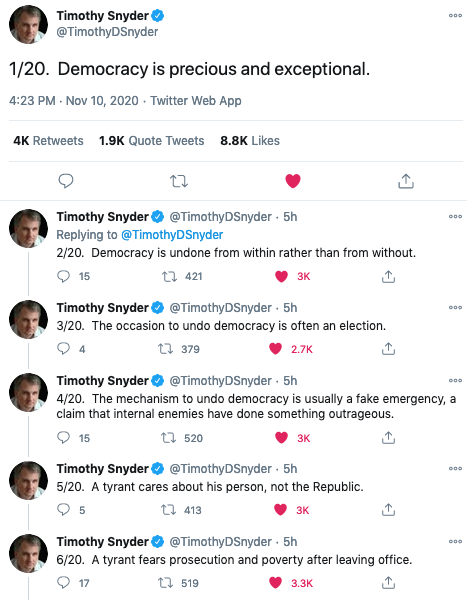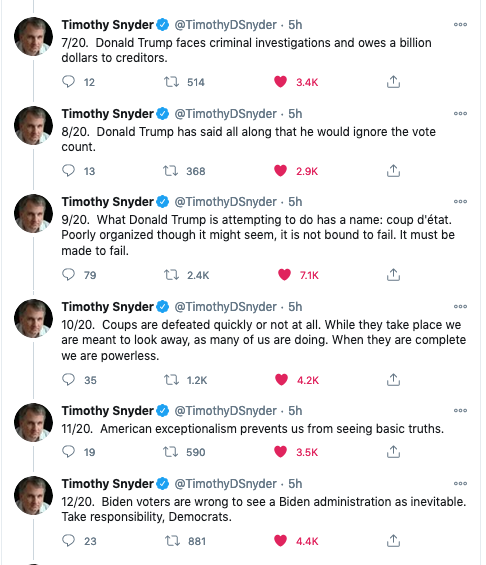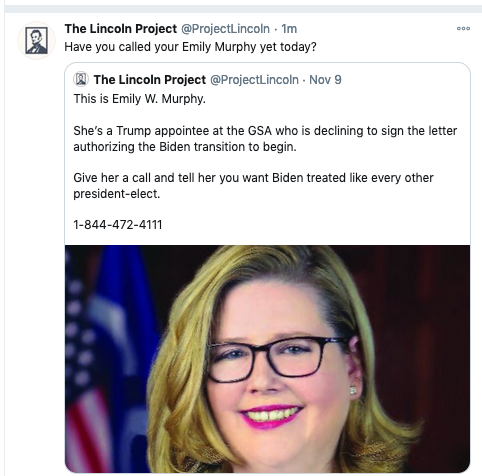Putin just shot down the Hunter Biden claims… wow.
Management company owned by Jared Kushner files to evict hundreds of families as moratoriums expire
White House adviser’s company, Westminster Management, and other landlords prepare to remove tenants behind on rent during the pandemic.
He was already resigning, but Trump, in a typically petty move, just had to beat him to it:
Apparently Loeffler and Perdue feel the Georgia SoS didn’t cheat enough for them.
Growing Discomfort at Law Firms Representing Trump in Election Lawsuits
Some lawyers at Jones Day and Porter Wright, which have filed suits about the 2020 vote, said they were worried about undermining the electoral system.
Like many big law firms, Jones Day, whose roots go back to Cleveland in the late 1800s, has prided itself on representing controversial clients.
There was Big Tobacco. There was the Bin Laden family. There was even the hated owner of the Cleveland Browns football team as he moved the franchise to Baltimore.
Now Jones Day is the most prominent firm representing President Trump and the Republican Party as they prepare to wage a legal war challenging the results of the election. The work is intensifying concerns inside the firm about the propriety and wisdom of working for Mr. Trump, according to lawyers at the firm.
Doing business with Mr. Trump — with his history of inflammatory rhetoric, meritless lawsuits and refusal to pay what he owes — has long induced heartburn among lawyers, contractors, suppliers and lenders. But the concerns are taking on new urgency as the president seeks to raise doubts about the election results.
Some senior lawyers at Jones Day, one of the country’s largest law firms, are worried that it is advancing arguments that lack evidence and may be helping Mr. Trump and his allies undermine the integrity of American elections, according to interviews with nine partners and associates, who spoke on the condition of anonymity to protect their jobs.
At another large firm, Porter Wright Morris & Arthur, based in Columbus, Ohio, lawyers have held internal meetings to voice similar concerns about their firm’s election-related work for Mr. Trump and the Republican Party, according to people at the firm. At least one lawyer quit in protest.
Already, the two firms have filed at least four lawsuits challenging aspects of the election in Pennsylvania. The cases are pending.
The latest salvo came on Monday evening, when the Trump campaign filed a suit in federal court in Pennsylvania against the Pennsylvania secretary of state and a number of county election boards. The suit — filed by lawyers at Porter Wright — alleged that there were “irregularities” in voting across the state.
In recent days, Mr. Trump and his allies have been trying to raise money to bankroll their legal efforts. Some of the fund-raising entreaties have noted that a portion of donated money might be used to pay down the campaign’s existing debts, rather than to fund new legal efforts.
While it is not clear which law firms will be filing the suits, Jones Day has been one of Mr. Trump’s most steadfast legal advisers.
As Mr. Trump campaigned for president in 2016, a Jones Day partner, Donald F. McGahn II, served as his outside lawyer, leading recount fights in critical states. Mr. McGahn later became Mr. Trump’s White House counsel, before returning to Jones Day.
At the time, some senior lawyers at Jones Day objected to working closely for a polarizing presidential candidate, according to three partners at the firm. They grimaced at the sight of Mr. McGahn standing with Mr. Trump onstage after he won the New Hampshire primary in February 2016. A month later, the firm hosted a meeting at its Capitol Hill office with Mr. Trump and Republican lawmakers as he sought to win over the party establishment.
The firm’s work for Mr. Trump has also garnered it unfavorable public attention. “Jones Day, Hands Off Our Ballots,” read a mural painted on the street outside the law firm’s San Francisco offices late last week.
During the Trump presidency, Jones Day has been involved in some 20 lawsuits involving Mr. Trump, his campaign or the Republican Party, and it worked for the Trump campaign on government investigations into Russian interference in the 2016 election.
The work has been lucrative. Since 2015, Jones Day has received more than $20 million in fees from the Trump campaigns, political groups linked to Mr. Trump and the Republican National Committee, according to federal records. Jones Day lawyers said that was a small portion of the firm’s overall revenue.
In addition to Mr. McGahn, a number of other partners at the firm joined the Trump administration. Noel Francisco became Mr. Trump’s first solicitor general. Eric Dreiband is an assistant attorney general in the Justice Department.
Before the 2020 campaign, some partners at Jones Day said, they had to reassure clients that the firm’s representation of the Trump team would not influence the rest of the firm’s work, according to four partners. Lawyers at the firm have worked to promote gun control and have represented unaccompanied minors, including many detained by the federal government.
But partners generally swallowed their concerns about the close relationship with Mr. Trump.
Then the president and his allies, down in the polls, began fanning fears about voter fraud, part of a broader effort to sow doubts about the integrity of the election.
“Many of the GOP’s litigation concerns are meritorious in principle. But the president’s inflammatory language undercuts the claim that Republicans seek merely to uphold statutory safeguards needed to validate the results’ credibility,” Benjamin L. Ginsberg, a longtime Republican elections lawyer who left Jones Day in August, wrote in The Washington Post the following month.
After the election, as Mr. Trump’s reported lead in Pennsylvania was evaporating, Jones Day and Porter Wright petitioned the Supreme Court to segregate all ballots received after Nov. 3. Pennsylvania, they wrote in their brief, “may well determine the next President of the United States.” A prominent Republican lawyer, John M. Gore, is helping to lead the effort at Jones Day. He previously served as an assistant attorney general in Mr. Trump’s Justice Department.
On Friday evening, Justice Samuel A. Alito Jr. ordered election officials in Pennsylvania to keep late-arriving ballots separate and not to include them in announced vote tallies. (Pennsylvania’s secretary of state had already given the same guidance.)
Six Jones Day lawyers said that given the small number of late-arriving ballots involved in the litigation, and the fact that they already had been segregated, the main goal of the litigation seemed to be to erode public confidence in the election results.
Jones Day did not respond to a request for comment.
In recent days, two Jones Day lawyers said they had faced heckling from friends and others on social media about working at a firm that is supporting Mr. Trump’s efforts.
A lawyer in Jones Day’s Washington office felt that the firm risked hurting itself by taking on work that undermined the rule of law. “To me, it seems extremely shortsighted,” the lawyer said.
This year, Jones Day has received more than $4 million in fees from Mr. Trump, political groups supporting him and the Republican National Committee, according to the most recent Federal Election Commission records.
A number of Democratic and Republican partners at Jones Day said that while some of their colleagues were grumbling about the Trump relationship, it was the firm’s obligation to continue representing long-term clients, even if individual lawyers disagreed with their politics or tactics. Two partners recalled how Jones Day had stuck with Art Modell, the embattled Cleveland Browns owner, even when there were death threats against the firm’s lawyers and security staff had to escort employees in Cleveland to their cars.
The outcry at Porter Wright, which like Jones Day was founded in the 1800s in Ohio, appears more intense.
In the past week, the firm has filed multiple lawsuits in Pennsylvania, trying to poke holes in the reliability of the election results on behalf of the Trump campaign and the R.N.C., among others. Porter Wright has received at least $727,000 in fees this year from the Trump campaign and R.N.C., according to federal records.
Over the summer, some lawyers at Porter Wright were dismayed to learn that the firm would be representing the Trump campaign in Pennsylvania, according to three current and former employees.
Chief among their concerns: How could lawyers, whose profession is based on the rule of law, represent someone who they felt had frequently tried to flout it? One lawyer said he was concerned that the firm might be asked to try to delay the election. Another said he quit in response to the decision to represent Mr. Trump in Pennsylvania.
At two meetings, associates at Porter Wright told the firm’s partners that they objected to the work for the Trump campaign, according to the three current and former employees. They were told that the assignment was limited to the election in Pennsylvania. That assurance struck some attendees as hollow, since the state might decide the election.
Robert J. Tannous, the firm’s managing partner, declined to comment in detail on the work for Mr. Trump. He said, “Porter Wright has a long history of representing candidates, political parties, interest groups and individuals at the local, state and federal levels on both sides of the aisle, and as a law firm will continue to do so.”
Sen Lindsey Graham (R-SC) Judiciary
Judiciary Hearing - Sen Graham wants to rewrite history on the CIA/FBI’s role in investigating Trump - with mentions of Dossier, Page, and of course their favorite - Peter Strok and Lisa Page.
Grilling going on…with this REWRITE Trump-Russia cases in mind. Message Graham wants to present which would be a sword (imaginary) that Trump/Graham can fall on…See how Trump’s admin was persecuted by FBI, etc.
Interview with ex FBI - Andrew McCabe
Sen Feinstein (D-CA)- comes through with Horowitz’s IG report that the investigation WAS to be opened. And that the Investigation was needed and the Crossfire Hurricane should have been opened. According to Horowitz, not opening the case would have been a ‘dereliction of duty.’
Crossfire Hurricane started - according to McCabe
Russians had been targeting us.
Comey had some ‘alarming’ conversations with Trump over the Russia.
Trump asks us publicly to say Trump was not under investigation.
Trump told Russia he fired Comey and got rid of him.
FBI felt that Trump had obstructed justice w/ Comey’s firing.
Then a Special Investigation was started via Rosenstein, and Mueller.
“Our concerns were valid and legitimate.” - McCabe
Per McCabe, Predominately statements of Pappadopolis might be coordinating w/ Russia and according to Mueller Report, there were over 100 affiliated conversations w/ Russia, intelligence services…and FBI was proven correct.
Per McCabe, according to Dir. Mueller - could not seek an indictment of sitting President. But Vol 2 at least 10 different behaviors that elements of obstruction of justice are present in his behavior. It is a compelling case that the Trump was obstructing justice. It was verified by Mueller Report.
Now all the R’s are ganging up against ex FBI McCabe - See #Sen Cornyn R-TX,
Both Sen Graham and Cornyn were recently re-elected and are upholding the BS that Trump was harmed and the FBI have gone ‘rogue.’
Turns out the sudden move by Loeffler and Perdue to try to discredit the Georgia election is a blackmail move by Trump to force them to back him or he’ll cut them off from his base in the runoffs:
The Jolt: The ‘orchestrated’ push to discredit Georgia’s election sparks more GOP infighting
Postal worker admits fabricating allegations of ballot tampering, officials say
From Professor Snyder who wrote the book “On Tyranny” and what are some obvious signs for T’s moves now, not conceding, calling election a fraud and R’s compliance as a move towards Authoritarianism.
DOD head fired Sec Esper
and fill ins with Trump loyalists.
Next do we think Sec Wray FBI or Sec Haspel CIA could be next…as has been rumored?
Begs the question WTF do we do now.
Timothy Snyder
@TimothyDSnyder
Levin Professor of History at Yale. Author of “Our Malady,” “The Road to Unfreedom,” “On Tyranny,” “Black Earth,” “Bloodlands,” and “Reconstruction of Nations”
Trying to kick up dirt where there is none for election fraud. Just as in above, authoritarian moves…delegitimize the voting process.
Over the last several days, the president, members of his administration, congressional Republicans and right wing allies have put forth the false claim that the election was stolen from Mr. Trump and have refused to accept results that showed Joseph R. Biden Jr. as the winner.
But top election officials across the country said in interviews and statements that the process had been a remarkable success despite record turnout and the complications of a dangerous pandemic.
“There’s a great human capacity for inventing things that aren’t true about elections,” said Frank LaRose, a Republican who serves as Ohio’s secretary of state. “The conspiracy theories and rumors and all those things run rampant. For some reason, elections breed that type of mythology.”
Steve Simon, a Democrat who is Minnesota’s secretary of state, said: “I don’t know of a single case where someone argued that a vote counted when it shouldn’t have or didn’t count when it should. There was no fraud.”
“Kansas did not experience any widespread, systematic issues with voter fraud, intimidation, irregularities or voting problems,” a spokeswoman for Scott Schwab, the Republican secretary of state in Kansas, said in an email Tuesday. “We are very pleased with how the election has gone up to this point.”
The New York Times contacted the offices of the top election officials in every state on Monday and Tuesday to ask whether they suspected or had evidence of illegal voting. Officials in 45 states responded directly to The Times. For four of the remaining states, The Times spoke to other statewide officials or found public comments from secretaries of state; none reported any major voting issues.
Statewide officials in Texas did not respond to repeated inquiries. But a spokeswoman for the top elections official in Harris County, the largest county in Texas with a population greater than many states, said that there were only a few minor issues and that “we had a very seamless election.” On Tuesday, the Republican lieutenant governor in Texas, Dan Patrick, announced a $1 million fund to reward reports of voter fraud.
“Many of the claims against the commonwealth have already been dismissed, and repeating these false attacks is reckless,” said Jacklin Rhoads, a spokeswoman for Josh Shapiro, a Democrat who is Pennsylvania’s attorney general. “No active lawsuit even alleges, and no evidence presented so far has shown, widespread problems.”
Note: There it is…lots of paper presented, and Kayleigh is using that as a way to seem convincing. However, there has been virtually no evidence. What a team of charmers.
Detroit is in Michigan’s Wayne County. In 2016, Donald Trump won 228,993 votes in the county to Hillary Clinton’s 519,444, giving her a 38.8-point victory. Last week, he fared better, winning 264,149 votes (a 15 percent increase) to Joe Biden’s 587,074 (a more modest 13 percent rise than Clinton’s). Trump still lost the county, but by only 37.9 points.
Unfortunately for his reelection chances, he fared much worse in other parts of the state. As of writing, he trails the president-elect by nearly 150,000 votes. Michigan is one of the three states he flipped in 2016 on his way to winning the White House; it’s now the state out of those three where he suffered the worst loss.
For some reason, though, Trump’s zombie campaign organization has decided that it will focus on Wayne County as it elevates its unfounded allegations of rampant voter fraud in the recent election, allegations that have been repeatedly rejected by state officials and for which no evidence has been presented.
On Tuesday night, the campaign sought to rectify that gap. White House press secretary Kayleigh McEnany, donning her legally dubious Trump-campaign-worker hat, appeared on Fox News to inform host Sean Hannity that the campaign had collected hundreds of affidavits alleging improprieties in the vote in Wayne County.
She rifled through them in front of the camera, offering a taste of what the documents contained.
McCabe reiterates FBI believed ‘the president might himself pose a danger to national security’
Also, warning, I am getting a really funky response from USAToday.com. Two browsers refuse to open it, with Chrome stating security issues, and “Is it Down For Me” also came back with an error when they tried.
I can open it in Firefox…
But anytime things start to look weird on the internet - no access, down, etc, it feels weird, right?
Here’s the response you get if you try to reach GSA.gov - Emily Murphy must be getting a LOT of calls per the The Lincoln Project.
She must feel that Biden as President-elect is not eligible. WTF
I even tried deleting cookies. Oddly, one that came up when I looked was: www.cashnetusa.com.
Accessed 2 hours ago when I first had the issue.
Very strange.
https://downforeveryoneorjustme.com/ can’t reach it but two other down-checker sites can.
Republicans are taking the cue to keep ‘unspoken standard.’ on T’s activities now - especially firing Sec DOD Esper etc. in the face of the Georgia runoffs. Allowing T to hollow up more of the defenses of this country and get his yes men in there…is beyond destructive.
“They see the extraordinarily high stakes in the Georgia Senate runoffs,” American Enterprise Institute congressional expert Norm Ornstein said Wednesday. “Creating a deep internal division in the party right now could jeopardize those seats, and the calculus they’ve made is that sticking with Trump is a better course of action at this stage.”
GOP leaders have set an “unspoken standard,” as it was put by one of several congressional Republican aides who spoke on the condition of anonymity to discuss internal conversations, not to “rock the boat too much before Georgia.”
But the president’s decision to replace Defense Department leaders with Trump loyalists — including one person previously deemed too controversial for Senate confirmation — nonetheless has grievously upset most Republican members, the aides explained, particularly as it appears clear that Trump fired Esper in retribution for their policy differences.
Here’s a primer from voting expert and writer, Ari Berman with Mary Harris of Slate- when it all comes down to the Statehouses, and the way the power is structured there. Think - redistricting (post 2020 census), gerrymandering, and non-citizen questions, judgeships, and balance of legislative power.
It’s the statehouses, stupid.
Republicans are complaining that something’s not quite right with the presidential election, but the very same ballots voters used to elect Joe Biden helped the GOP run up their numbers, not just in Congress but in a whole bunch of state legislature races. Democrats had hoped to take control of Pennsylvania, Michigan, Minnesota, Texas—and it didn’t happen. On Wednesday’s episode of What Next, I spoke with Ari Berman, a senior reporter at Mother Jones, about what’s happening in these states and how it may cement Republican power across the country for the next decade. Our conversation has been edited and condensed for clarity.
Mary Harris: We’ve talked a lot about down-ballot races and the Senate and the House on this show, but I’ve heard a lot less conversation about state legislatures. Do you think that’s a miss?
Ari Berman: I do think it’s a miss. We are heading into another redistricting cycle in 2021, and it’s the state legislatures that were elected in 2020 that are going to draw those maps for the next decade and determine which way all these pivotal swing states go. I think one of the biggest consequences of the 2020 election, which has not gotten much attention, is what happened in all of these different state legislative races.
Can you give me the 101 version of why we need to be paying attention?
Statehouses are important in a lot of different ways. They control voting laws. They control health care. They control environmental laws. But if you’re talking just about political power, state legislatures, with a few exceptions, are the ones that draw districts both for themselves and also for the House of Representatives. So the districts that these state legislatures are going to draw in 2021—which is when the next redistricting cycle happens—are going to determine who’s in control of these legislatures for the next decade. It’s also going to determine what the House of Representatives looks like for the next decade. State legislatures don’t get a whole lot of attention, but when it comes to how political power is distributed in America, they are incredibly, incredibly important.
Can you characterize how Democrats and Republicans went into this election thinking about the state legislatures? My impression is Democrats were pretty confident in how they’d do.
Democrats felt really good about their position with regard to picking up state legislative seats and chambers heading into the 2020 cycle. Republicans dominated the process in 2010, and they won the power to draw four times as many congressional districts as Democrats did. They basically held control of all of these key states, whether it was Wisconsin or Ohio or Pennsylvania or Florida, and they remain in control of all of those states now. Democrats felt like they had a good opportunity to pick up some serious gains. They thought maybe they could flip the Texas House of Representatives, maybe they could flip the Iowa House, maybe they could take back the North Carolina General Assembly, maybe they could win seats in Florida, maybe they could win seats in Pennsylvania. They really thought that they would be in a much better position. And it just didn’t turn out that way.
How would you characterize what happened instead?
Republicans basically held all of their vulnerable chambers and seats. And right now it looks like, with a few exceptions, the post-2020 redistricting cycle is going to look very similar to the post-2010 redistricting cycle, when Republicans dominated the process.
This year was the best opportunity for Democrats, because one of the things I heard all the time was Barack Obama wasn’t on the ballot in 2010, so it was really hard to increase turnout in an off-year election. Well, this year you had Joe Biden on the ticket, you had high Democratic turnout, and they were still unable to flip these state legislative chambers. So you just wonder, when are they going to get a better opportunity? Especially because the elections in 2022 are going to take place under new maps that Republicans are going to draw. You can be sure as hell that Republicans are going to do everything they can to try to entrench their power after 2020, just like they did after 2010. And the technology to do so is going to become even more sophisticated.
If you look back at the 2010 midterm elections, no state haunts the Democrats more than Wisconsin. The statehouse, the Senate, and the governorship all flipped red that year, giving Republicans total control over the 2011 redistricting cycle.
What happened after 2010, when Republicans took over, is they passed one of the most extremely gerrymandered maps in the country, which led to a situation where Republicans in Wisconsin have consistently gotten fewer votes than Democrats statewide, but they’ve retained huge majorities in the Legislature.
You realize just what an insurmountable barrier gerrymandering can be: Nobody I talked to believed that either body of the Legislature was in play, even though Wisconsin has a Democratic governor, even though it has a Democratic lieutenant governor, even though it has a Democratic senator, even though Joe Biden won the state**. If you think of Wisconsin as kind of a quintessential swing state, you would believe that the Legislature would also be in play. But it wasn’t. And that was pretty much the case for almost all of the swing states this time around.**
I do think it’s a really interesting tale of what happens when districts are gerrymandered like this, because the Democrats really did try to stage a comeback in Wisconsin. They elected a Democratic governor, Tony Evers. But from the beginning, he was fighting with the Legislature. Members were very comfortable finding ways to block his gubernatorial power. And so you can see this hardening of sides.
“Redistricting is the next huge fight that’s going to happen.” — Ari Berman
The first thing Republicans did after Evers was elected governor in 2018 was strip him of his power in key respects. They said that he couldn’t do all of these things that previous governors, whether they were Democrats or Republicans, had the power to do. That really set the tone for what Wisconsin was going to look like. All throughout his administration, they have not cooperated with him. They’ve challenged his ability, for example, to get COVID under control. They refused to postpone the presidential primary in April, leading to those disastrous images of people waiting in line for hours. And unfortunately, I think that’s a playbook Republicans are going to try to use against Joe Biden. If you paid attention to how Wisconsin Republicans treated Tony Evers after he won, you should not be at all surprised by the way that Republicans are treating Joe Biden right now: to try to delegitimize his election, not cooperate with him, and do everything they can to try to hamstring his ability to govern once he’s elected.
Wisconsin Republicans may have control of both legislative houses, but their efforts are going to be met with Evers and his veto power.
This is going to be a major fight because you have states like Wisconsin and Pennsylvania that have Republican state legislatures and Democratic governors, and traditionally, Democratic governors are able to veto redistricting mafias. That leads to compromise, or it goes to the courts. What Republicans in Wisconsin are definitely going to try to do is strip the governor of his ability to veto those maps they’ve already hinted at there. Conservatives have a 4–3 majority on the state Supreme Court, so if it goes to state court, they have an advantage here.
Redistricting is the next huge fight that’s going to happen. And it hasn’t really gotten a whole lot of attention because obviously we’re not in 2021 yet. But once we get the census data, they’re going to draw new districts.
You once talked about a state senator in Texas named Carol Alvarado. She’s in Houston, and she was worried about this election and what was coming down the pike in terms of gerrymandering. Do you want to talk about her and how meeting with her helped you think about what’s about to happen in Texas?
She was worried, but she was also pretty confident Democrats were going to take back the state House and have a seat at the table when it came to redistricting—but now they won’t. So it looks like there’s going to be more extreme gerrymandering in Texas in 2021 than there was even in 2011. And Republicans could do something potentially that they weren’t able to do in the last cycle: draw districts based on eligible voters, not total population, meaning they could try to exclude people like children or immigrants who are not eligible voters. Those immigrant communities are heavily concentrated in Democratic areas and places like Carol Alvarado’s district in the eastern part of Houston, which is a heavily Latino area.
Trump sort of opened the door to this, right?
There was an attempt by the Trump administration to add a question about citizenship to the U.S. census, which failed, but then Trump issued an executive order basically saying that he was authorizing the Census Bureau to estimate citizenship data through other means, through what they call administrative records, government records. So now the Census Bureau is in the process of basically estimating the level of citizens and noncitizens in the country. Then that data could be given to states like Texas, which could be able to potentially draw districts that exclude nonvoters from counting. Now, this is going to go to the Supreme Court. There’s no question about it. I’m not totally convinced it won’t be sympathetic to states like Texas.
And states like Texas are changing demographically in a way Wisconsin is not: huge numbers of immigrants, noncitizens, lots of people becoming citizens every single day who are helping push the state blue eventually. I think in the states that are changing demographically, Republicans are probably going to be the most aggressive in trying to use this citizenship data to exclude nonvoters or noneligible voters from counting.
Alvarado is a woman of color. Did she worry these redistricting efforts would mean she could lose her seat, because there would just be less Latino representation?
She did. If you look at her district, so many people, whether they’re children or immigrants, are not eligible to vote. So her district could be submerged in a different district. She could be drawn out of a district and put in a district with another Democrat, or she could be drawn out of her district and put in a district with another Republican. But it would be hard for her to maintain her status if she were to lose so many constituents. So this is a real threat to Latino representation in a place like Texas. And I’m sure Texas Democrats are very, very nervous right now.
Is there a way to connect the dots between Trump’s refusal to concede and what’s happening at the state level? Are these actors kind of speaking to each other with how they’re behaving?
I do think they are. You’re seeing Republicans at the state legislative level raise a lot of the same false claims about irregularities that Trump is saying. It’s not getting as much attention because these people are not Donald Trump, but in Wisconsin and Pennsylvania and Michigan, Republicans are all calling on the election to be investigated, which is funny because they remain in control of all of these states at the state legislative level. So, again, if there were such irregularities there, how are they still in power? But you can imagine a situation next year where they start passing policies to make it more difficult to vote based on these totally baseless accusations of election irregularities. They could say we need to make it harder to vote by mail because Democrats use that more than Republicans did, or we need to cut back on early voting because that led to record turnout. New barriers to registering voters, things like that. I’m not saying they will do that, but I could very well see Trump’s rhetoric giving them an opening to say we need to tighten the election process to try to root out these “irregularities,” even if these irregularities don’t actually exist.
The Democrats seem to lack the organizational knowhow, the infrastructure to compete with Republicans in these states they see as battlegrounds. Is my perception right here or am I just being cynical?
I don’t know if that’s totally true when it comes to state legislative races, because Democrats raised more money than Republicans did with state legislative races. They had really high-profile figures like Eric Holder working on these races. I don’t think it was for lack of effort or for lack of organization. I just think these were really, really difficult places to win seats. And I think Democrats have a red America problem. It’s very, very clear they’re not competing as strongly as they should be in states that are red or haven’t flipped yet from red to purple. And a lot of the seats that needed pickup were in the redder parts of purple states. It was about the more conservative suburban areas, the rural areas? That’s where the Democratic Party really underperformed. Donald Trump ran up huge margins there. That was enough for Republicans to be able to hold control of all of these state legislative chambers.
You made a pretty good case that Democrats are stuck here—it’s hard to win back seats when your districts have been gerrymandered. Is there a path to change here, or are we really in the mud?
There’s been some progress. There are going to be states like Michigan that now have independent redistricting commissions, so there will be more states that draw districts in a bipartisan way or an independent way, which is going to be one positive going forward. I think Democrats are still going to try to pick up governor’s races, for example, where they’re statewide and don’t have to worry about gerrymandering, and they’re going to try to use that as a check. They’re going to keep putting attention on state courts, on state supreme courts, because those courts are going to oversee the redistricting process in many places. But I do think it’s going to be a lot more difficult for them to pick up state legislative seats in 2022, once these districts have been gerrymandered again. This is not going to be a two-year strategy for Democrats. They’re going to have to have a long-term strategy. They’re going to have to have a strategy for the next decade in terms of trying to win back some of these seats. That’s going to require a lot of patience and a lot of organizing and a lot of thinking about what to do here, because at the state legislative level, there’s not a quick, easy fix.







